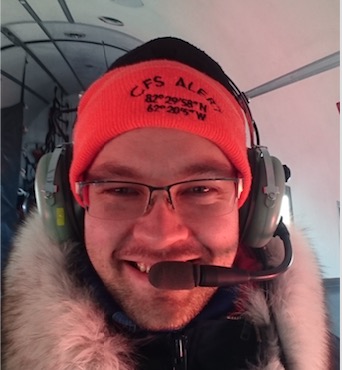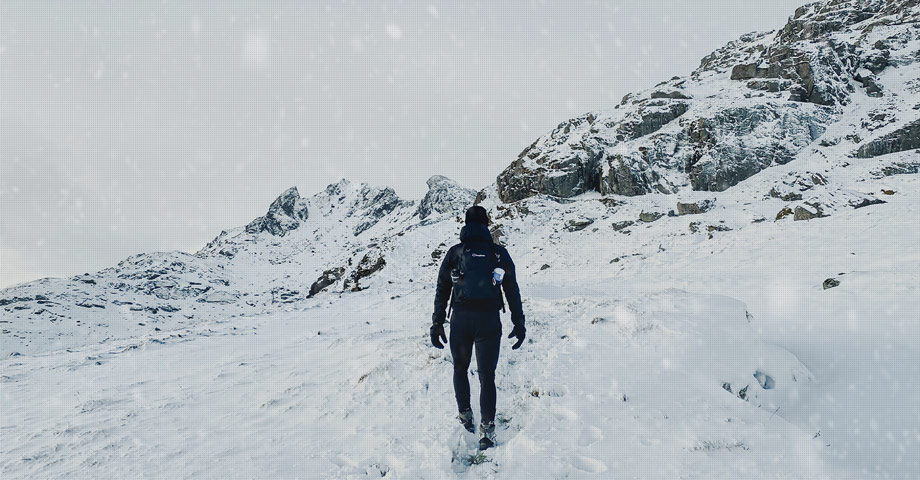In this post, arctic researcher Arttu Jutila tells his story about conducting his PhD study, taking him from Finland to Canada and finally to Germany. Driven by his fascination with snow cover and sea ice, he followed persistently his dream to pursue an academic career. On top of the challenges that any doctorate creates for PhD candidates, Arttu had to cope with the challenges that COVID-19 posed to him. Read about the lessons he learned from his PhD study and the skills he recommends acquiring.
Guest post by Arttu Jutila
It all started with snow
When people ask me what I studied, I like to describe it in a slightly poetic way. I studied the life-cycle of a snowflake: how it forms in the clouds, falls down and forms snow cover, and how the snowpack evolves through the winter until it melts away or forms a glacier. In short, I majored in geophysics with a cryospheric (frozen Earth) focus with meteorology as a minor. I have always felt curious about things–especially those found in nature. Why is something the way it is? I guess it is a kind of thirst for knowledge, and I have always liked school and studying as there’s still so much unknown!
After finishing my master’s degree, I knew that I wanted to stay in academia and continue doing research. Unfortunately, my professor was about to retire and while his successor was still unknown, I turned my attention to opportunities in other universities and abroad. The international email distribution list for my field of science is always abundant in job and PhD position announcements but, at the time, very few of them had snow as their main topic. When I came across the first one that did, I jumped into action. It was about measuring snow thickness on sea ice using microwave radars. I was really lucky to get a lot of help with the application from a senior scientist whom I got to know earlier on a research cruise. Evidently, my application was good enough—I got the position. It was intriguing to expand my expertise about snow from terrestrial applications to sea ice with a completely new set of tools—and to do all this in a foreign country, no less.
My doctoral journey into the Arctic
Without a shadow of a doubt, the most exciting moments during my doctoral work have been the field campaigns. Despite having grown up in Finland north of the Arctic Circle, going back to the Arctic is a special experience every time. I’ve been extremely lucky to have participated in a total of three field expeditions on land, in the air, and at sea across the Arctic. At work, I’ve experienced the absolute pitch-black 24-hour darkness of the Arctic midwinter close to the North Pole and seen a quick glimpse of a polar bear mum with two cubs traversing sea ice while whizzing past just 60 metres above them in a World-War-II-era aeroplane in beautiful spring sunshine. Unforgettable moments like these carried me through the laborious and long hours at the office.
Another exciting experience was my two-month research visit to collaborate with the climate process researchers at the Environment and Climate Change Canada institute in Toronto. The doctoral program of my institute offers short-term research grants to undertake part of the doctoral studies in another country for two to three months, and I applied for the opportunity to start building an international network while working on a specific aspect of my research. An added bonus was the time difference to my home institute–by the time I started working in Toronto, most emails of that day were either outdated or already dealt with by others. Perfect, I could fully concentrate on my own work!
Finally, I remember the excitement when my first paper was published: to see my own name as the very first one on the author list and to think that someday I could see it cited in someone’s paper!

Headwinds ahead: COVID-19
The most difficult and challenging aspect of my doctorate, as it probably was and still is for many others these days, was dealing with COVID-19. In my case, the outbreak of the pandemic coincided with returning from a four-month-long expedition deep in the Arctic.
After pushing a 6.5-day working week for more than two months in the field, I switched from 100 % working mode to 0 % for the four-week transit on a ship back to mainland Europe. That started the “post-expedition blues.” After arrival, I felt more isolated due to COVID than I was during the expedition with 100 fellow scientists and crew further away from civilisation than the International Space Station.
I felt lonely even at the office, where sharing offices was strictly prohibited and most colleagues were working remotely. I completely lost all motivation for any work for a couple of months at least, but taking holidays or going back home to Finland didn’t make sense due to travel restrictions. Eventually, I think I got used to life with COVID around. But early the next year, while trying to make up for the lost time amidst the panic of finishing my doctorate on time, I overshot my efforts by working too much. I stopped counting consecutive working days after I reached 100 and probably suffered burnout to some degree.
Despite the struggles, I feel that the ups outweigh the downs. I’ve always been determined to finish what I’ve started, and to do it well enough so that I don’t have to return to it. Although on this occasion, I needed some extra time to accomplish it. It took quite some effort to convince myself to do it, but a couple of months of unemployment was a much-needed breather that reduced the pressure a bit. It allowed me to finalise a thesis with which I could be satisfied. I’m grateful for the support not only from my supervising professor, but also from the other members of my thesis advisory committee. Looking back, though, I wish I would have dared to bother them with questions more often.

Getting the thesis done—finally!
In the end, I wrote a sort of hybrid monograph thesis, where the chapters were based on my papers and drafted manuscripts. The rules of my faculty at the university stated that for an accumulative paper-based thesis, I would need several accepted or published papers. In my opinion, that’s a lot to ask for a three-year doctorate taking into account all the time that goes into proper peer-review processes.
Writing papers and the thesis felt enormously scary–a seemingly unconquerable monster of a task at first. Towards the end of my first year, I took two back-to-back TRESS ACADEMIC courses about peer-reviewed publishing. My doctoral program told me to take the one-day introductory course first and the more advanced and hands-on three-day course later in the spring. I reasoned my way into taking the advanced course because I knew I would be doing field work next spring. The next time the advanced course was offered indeed overlapped with my field work, and I think learning those essential writing skills even later would have delayed my project further. In this course, I got lots of excellent advice on scientific writing, but one piece of advice still stands out that I wish my supervisors or someone else had told me right at the beginning of the doctoral project: if suitable, turn your literature review into a review paper! Boom, that’s one paper done!
Lessons learned from my PhD process
While I’m happy to be done with the doctorate, it’s not an experience that I’m planning to do again any time soon. But if I were to do it all over again, I would definitely like to do it without COVID-19 around, that’s for sure. I would also ask my supervisors, other colleagues, and friends more questions and for help–not only about scientific issues, but also about getting by in life in general when I hit a rough patch.
Quite a few times I realised that I needed to improve my project management skills to keep that common thread firmly in my hands and to avoid getting sidetracked or delayed. I would tinker with minuscule features in figures or edit a text as close to perfection as I could, only to find out that reviewer #2 wants it completely the other way.
I’m still torn between saying “no” to opportunities that are not strictly related to the project at hand. Sometimes, they offer awesome once-in-a-lifetime experiences, like the MOSAiC expedition. It wasn’t directly related to my doctoral project, but having participated in an expedition of that scale can potentially carry me on for decades to come. It’s an exception to the rule that I’ll allow myself.
About Arttu:

Arttu has always been fascinated by snow, probably due to being born and raised in Northern Lapland in Finland, and holds bachelor’s and master’s degrees in hydrospheric geophysics with a cryospheric focus from the University of Helsinki, Finland. In 2018, he moved to Germany to pursue a doctoral degree while doing research work at the Alfred Wegener Institute Helmholtz Centre for Polar and Marine Research (AWI) in Bremerhaven. In spring 2022, Arttu got his doctorate in natural sciences from the University of Bremen. He is currently working at AWI as a postdoctoral researcher focusing on multi-sensor airborne sea-ice observations. You can connect with him directly by email or on ResearchGate.
So far, Arttu has published the following papers from his doctorate:
- Jutila,A.,King,J.,Paden,J.,Ricker,R.,Hendricks,S.,Polashenski,C.,Helm,V.,Binder, T., and Haas, C. (2022) High-Resolution Snow Depth on Arctic Sea Ice From Low- Altitude Airborne Microwave Radar Data, IEEE Transactions on Geoscience and Remote Sensing, 60, Art no. 4300716.
- Jutila, A., Hendricks, S., Ricker, R., von Albedyll, L., Krumpen, T., and Haas, C. (2022) Retrieval and parameterisation of sea-ice bulk density from airborne multi-sensor measurements, The Cryosphere, 16, 259–275.
More information
Do you want to successfully complete your PhD? If so, please sign up to receive our free guides.
Photo by Craig Bradford on Unsplash.
© 2022 Tress Academic
